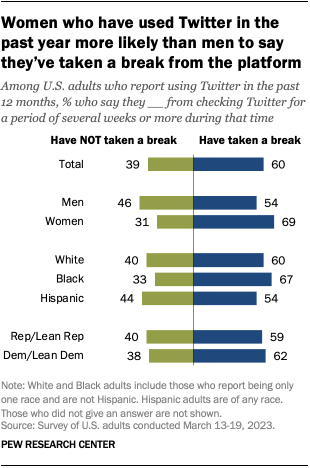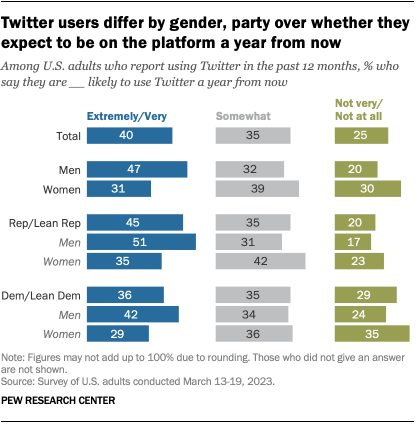A majority of Americans who have used Twitter in the past year report taking a break from the platform during that time, and a quarter say they are not likely to use it a year from now, according to a Pew Research Center survey conducted about five months after billionaire Elon Musk acquired the site.
Pew Research Center conducted this study to gain insight into Twitter users’ habits on the platform. This analysis is based on a survey conducted among 10,701 U.S. adults from March 13 to 19, 2023. It focuses on current and recent Twitter users, defined as those who answered yes to either of these questions: “Do you use Twitter?” or “Have you used Twitter in the past 12 months?”
Everyone who took part is a member of Pew Research Center’s American Trends Panel (ATP), an online survey panel that is recruited through national, random sampling of residential addresses. This way, nearly all U.S. adults have a chance of selection. The survey is weighted to be representative of the U.S. adult population by gender, race, ethnicity, partisan affiliation, education and other categories. Read more about the ATP’s methodology.
Here are the questions used for this analysis, along with responses, and its methodology.

Six-in-ten Americans who have used Twitter in the past 12 months say they have taken a break from the platform for a period of several weeks or more during that span, while roughly four-in-ten (39%) say they have not done this, according to the survey of U.S. adults, conducted March 13-19, 2023.
Some groups are more likely than others to say they have taken a break from the platform, with especially pronounced differences by gender, race and ethnicity. Among current and recent Twitter users, women are more likely than men to say they have taken a break from the platform in the past year (69% vs. 54%). And Black users (67%) are more likely than their White (60%) or Hispanic (54%) counterparts to say the same. (There were not enough Asian American Twitter users to allow for a separate analysis.)
There are no significant differences by age or political affiliation when it comes to taking a hiatus from the platform.
These findings come amid debates in the media and even questions posed by Musk himself about whether Twitter is “dying.” Since Musk acquired the platform, some celebrities have publicly announced their departures from the site and popular accounts have reported abnormally large gains and losses in followers, among other changes.

The survey also asked current and recent Twitter users how likely they are to use the platform a year from now. A plurality (40%) say they are extremely or very likely to use the site in a year, and 35% say they are somewhat likely to use it. But a quarter say they are not very or not at all likely to be on Twitter a year from now.
Among current or recent Twitter users, a larger share of women than men say it is unlikely they will be on the platform in a year (30% vs. 20%). Conversely, current or recent Twitter users who are men are more likely than women to say they likely will use the platform a year from now (47% vs. 31%).
This analysis also finds partisan differences in users’ plans to remain on the site, aligning with previous Center research that highlights how Republican and Democratic Twitter users have differing views of the platform. Greater shares of current or recent Twitter users who are Democrats or Democratic-leaning say it is unlikely they will be on Twitter in a year compared with their GOP counterparts (29% vs. 20%). Current or recent users who are Republican or Republican-leaning, in turn, are more likely than Democrats to say it is likely they will use the site a year from now (45% vs. 36%). Republicans are also more likely than Democrats to say they are extremely likely to be on the site at that time (25% vs. 17%).
There are differences by gender within both political parties on this question. Among current or recent Twitter users, Republican men stand out as the most likely to say they will use the platform a year from now (51%), compared with Republican women (35%) and with both Democratic men (42%) and women (29%).
Current or recent Twitter users who have not taken a recent break from the site are more than twice as likely as those who have taken a break to predict they will be on Twitter a year from now (63% vs. 26%). Just 8% of those who have not taken a break from the site say it is unlikely they will use Twitter in a year.
There are minimal differences by age in these responses.
Note: Here are the questions used for this analysis, along with responses, and its methodology.





